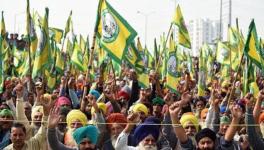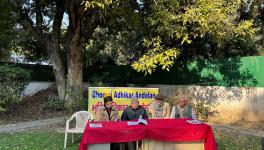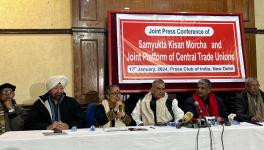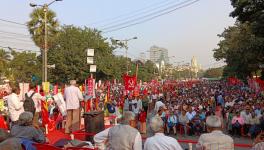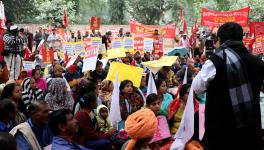‘Massive’ Participation Seen Across Sectors as 2-Day Nationwide Strike Call by CTUs Ends
New Delhi: The two-day nationwide strike on March 28-29, called by 10 central trade unions (CTUs), saw widespread participation across sectors “despite the threats of victimisation and intimidation by the employers as well as the governments."
From banks and insurance to railways, ports, telecom, coal mines, refineries to transport, tea gardens to scheme workers --- all sections of the working population came out on the streets to express their anger against PSU privatisation, dilution of labour laws, contractualisation of jobs, new pension scheme, lack of social security, price rise, falling incomes among others and pledged to intensify their fight to “Save the Nation and Save the People”
“The participation crossed 20 crores (the first day itself) facing all odds, ESMA, intimidation, and obstructions of all kinds including the high handedness of police in some cases and high court order in Kerala prohibiting strike for BPCL and Govt. employees,” a statement by the joint platform said.
The central trade unions that are part of the joint forum are INTUC, AITUC, HMS, CITU, AIUTUC, TUCC, SEWA, AICCTU, LPF and UTUC.
“The huge success of the two days’ general strike is an unambiguous warning to the Modi led BJP government, gloating over its recent electoral victories, that the workers and toiling people of this country are not going to tolerate its pro corporate and pro Super Rich neoliberal policies that enrich these exploiters by putting unbearable burdens on the toiling masses; that it cannot go ahead handing over the country’s wealth and resources including natural resources to the big corporates, domestic and foreign,” said a statement by CITU.
The strike call by trade unions was backed by the Samyukt Kisan Morcha, an umbrella body of over 40 farmer organisations that spearheaded the year-long farmers’ movement against three Central farm laws. Agricutural workers also participated in the strike call by joining in road blockades in several states.
"Workers in Sikkim and Arunachal Pradesh have joined the strike on the second day in addition to the workforce of the state on the agitation on Monday. Workers in almost all sectors have joined the strike. We got a good response from the rural band," Amarjeet Kaur, General Secretary of All India Trade Union Congress (AITUC), told PTI.
The 12-point charter of demands of the striking unions include scrapping of the four labour codes, no privatisation in any form, scrapping of National Monetisation Pipeline, increased allocation of wages under MNREGA (Mahatma Gandhi Rural Employment Guarantee Act) and regularisation of contract workers.
"There is a bandh-like situation in Tamil Nadu, Kerala, Puducherry, Andhra Pradesh, Telangana, Odisha, Assam, Haryana and Jharkhand," the forum said.
According to the forum, agitations were held in many industrial areas across Goa, Karnataka, Maharashtra, Chhattisgarh, Punjab, Bihar, Rajasthan, West Bengal, Meghalaya and Arunachal Pradesh.
Workers staged protests at several places and unions claimed the agitation had an impact in coal mining belts of Jharkhand, Chhattisgarh and Madhya Pradesh on Monday.
“Private sector industrial units including many MNCs witnessed massive strike action on both the days in Maharashtra, Karnataka, Tamilnadu, Telangana and Haryana. Hydel power projects also witnessed massive strike in Assam, Himachal Pradesh, Uttrakhand and Jammu & Kashmir,” the statement read.
Haryana: Women Take the Lead in Millennium City
In Gurugram, 36-year-old Renu, a cook-cum-helper, whose normal work day is from 7 a.m till late afternoon at a government primary school in Gurugram’s Chakkarpur village. After that, she manages a small embroidery business at home. Yet, the mother of two finds it difficult to make ends meet.
“My honorarium” – being considered as a volunteer under PM Poshan, earlier known as school Mid-Day Meal Scheme, she is not entitled to ‘wages’ – “is only Rs. 3,500. You tell me, how should I run my house in such a paltry income? There is not enough of embroidery work since the last many months,” she told Newsclick.
Renu is among the lakhs of scheme workers – anganwadi workers and helpers, mid-day meal workers, and ASHAs, among others – who has been at the forefront to provide supplementary food and nutrition along with health services to women and children in the country.
On Tuesday, Renu joined rallies and meetings by the all-women workforce to press the Centre to consider them as ‘government employees’ – it is a demand that has been pending for far too many years now.
In the millennium city, known to house top MNCs and industrial houses, the scheme workers, emboldened by an ongoing work strike of the anganwadi workers and helpers in the State, took the lead in protesting against the economic policies of the Narendra Modi – led Central Government.
“Today, we are not just protesting for the issues of one or two sections of the workers… it is fight for the whole working class in the country,” said Sarla Yadav, an anganwadi worker. The 42-year-old has been on strike, along with her “comrades”, since December 8 last year to demand, among others, an increment in their monthly honorarium –promised to them by the Central governemnt in 2018.
She was served a termination notice by the Manohar Lal Khattar – led BJP government in January this year, in a move that was flayed by the anganwadi caregivers’ unions in the State as a “repressive action.”
“For last four months, with no income, I am depended only on help from neighbours and my relatives to support my family,” said the mother of a daughter, adding that “the present government does not think about the welfare of the workers.”
The anger and despair among the workers was palpable. Ankit Lal (name changed) of one Sanoh India Private Limited, an automotive part manufacturer in Manesar that supplies auto components to Maruti Suzuki, said the rolling out of labour codes will make permanent jobs in the industrial sector a thing of past.
“Since 2000, not even a single worker has been regularised in the factory,” Lal alleged, adding that, as a result of which, only a fourth of the total manpower in the company is a permanent worker currently.
Highlighting similar concerns, A R Sindhu, national secretary, Centre of Indian Trade Unions (CITU), said the trade union movement in the industrial sector had been “dull” for the past few years in the country. “Yet, what we are seeing right now is that this trend is taking a new turn, finding encouragement from struggles waged over the years by scheme workers.”
Satbir Singh, state vice president, CITU – Haryana agreed that “women of Haryana are very close in bringing the State government down on its knees”.
Ronak Chhabra from Gurugram
Maharashtra: Good Response
In Mumbai Mahul's thousands of residents held 'Jan Jagaran Yatra' in Mahul, Mankhurd, Chembur, Shivajinagar area of Mumbai in support of the striking workers. People walking from lane to lane receiving support from citizens. The outrage over killing inflation was visible in Mumbai's working class areas that house families of street vendors, naka kamgar, helpers etc.
"People are realising that the common man is the victim of policies of Modi government. From inflation to ending security to labourers as well as various schemes of social security. The response to our rallies was tremendous on both days," said Jagdish Khairaliya, general secretary of Shramik Seva Sangh.
Mumbai is the financial capital of India. All the nationalised banks near Dalal Street were running on low capacity for two days.
"Modi government will have to repeal the four anti-labour laws, which are killing the voice of labourers and helping crony capitalists ignore labour rights. People need to stand up against these changes for their and their children’s future," said Vishwas Utagi, leader of a bank employees union.
Anganwadi workers also came out on both days as they have been protesting for hike in honorarium, pension, quality mobile phones, user friendly app to fill information about their work etc.
Industrial towns like Nasik, Aurangabad, Pune, Pimpri Chinchwad also seen effect of strike. CITU leaders like DL Karad, Vasant Pawar, Rajani Pisal, Shubha Shamim and others lead the strike in Nasik and Pune.
CPM MLA Vinod Nikole joined the protest in Dahanu. On Tuesday, a rasta roko was held at multiple locations in Palghar district. Hundreds of labourers and farmers joined the protest. All India Kisan Sabha also participated in Nasik, Ahmednagar, Sangali, Solapur in the national strike.
Former MLA Narasayya Aadam led the morcha of bidi workers and workers in mills in Solapur, who attended in large numbers. "Over the years I have seen that the labourers join hands firmly when the attack in their rights increases. Recent developments of new labour laws are attacks on labourers interests. This strong movement will reach all corners of India," said Aadam.
Amey Tirodkar from Mumbai
Tamil Nadu: Workers Protest in Large Numbers
Many sectors were on halt for the second consecutive day in Tamil Nadu. The massive participation of state transport corporation workers for two days in a row has shaken up the state. The big participation of ICDS workers in the all-India general strike also had a big impact in the state.
Many demonstrations were held in industrial belts across the state in industrial localities in North Chennai - Thiruvatriyur, Ambattur and Perambur, and Kanchipuram for the second day in a row.
While the participation of workers dropped in several sectors, there was an increase in some others. The participation of DMK-affiliated union workers fell on the second day. Maximum participation was from CITU and AITUC.
Around one lakh members of the Tamil Nadu Government Employees Association of 64 departments boycotted work on the second day. Workers from the revenue department participated in big numbers. Others included employees of the departments of rural development, agriculture, social welfare, etc.
On the second day of the strike, around 50,000 bank employees associated with BEFI, AIBOA and AIBEA went on strike in Tamil Nadu, while under the leadership of AIIEA and LICAO, 92% of insurance and LIC workers boycotted work and held demonstrations.
Tuticorin Port was on complete strike today for the second day. The 500 permanent workers, 750 contract workers and 1,000 odd private shipping company workers boycotted work. The workers restricted entry of all lorries and voiced their anger against the Union government’s move to privatise ports in the country.
In the highly profitable pharma sector, under the leadership of FMRAI, around 10,000 sales promotion employees across Tamil Nadu went on strike today.
Around 30% of the workers of the union government run power sector Bharat Heavy Electricals Limited (BHEL) were on strike in Trichy today.
Sruti MD from Chennai
West Bengal: Organised, Unorganised Sector Workers Join
The two-day strike call was effective in most part of the state, both among the organised and unorganised sectors, especially in the jute sector where 26 out of 52 mills were completely closed.
Bus services in Kolkata were more or less normal. However, in other districts, bus services were affected as nearly 100% bus workers joined the strike.
Engineering units Howrah district remained closed despite large scale police mobilisation by the state government to foil the Bharat Bandh call.
In West Bengal’s tea gardens, over 60% units remained closed and in the other units 60% of workers ditched work, according to sources in the Centre of Indian Trade Unions.
CITU sources said Eveready Batteries, a big manufacturing unit, remained completely closed, while workers in Britannia, Lipton, ITC, Indian Oil, Oil India and other big corporates also joined the strike in varying numbers.
About 65% of hosiery units remained closed and in the case of Braithwaite, Burn Standard, Jessop Construction, United Paints, Hind Ice remained closed.
All major markets, such as Barabazaar , Posta Chandni Chowk , New Market also remained closed. The police arrested 17 persons from central Kolkata for picketing during the strike.
According to CITRU sources, the strike was 100% in the banking and financial sector, 90% in Central units in the state, such as income tax department, postal services, Botanical Survey, Geological Survey etc.
In Darjeeling district, over 60% success was seen in the tea sector, while in Jalpaiguri district over 65 % tea gardens were closed. In Alipurduar , the strike was a 70% success, while in North Dinajpur over 50% units remained closed .
Over 30% coal workers joined the strike, as also in Durgapur steel plant and Burnpur Iisco.
Even 62% Ola and Uber cab drivers joined the strike, as per CITU
Sandip Chakraborty from Kolkata
Assam: Second Day of Detentions and Protests
For the second consecutive day, a massive bandh was witnessed across Assam, including Guwahati, with almost complete absence of public transport on the roads. Different sectors including refinery unions, tea workers’ union along with the CTUs organised protest demonstrations, rallies, sit-ins and picketing in different parts of the state.
Reports of detention of peaceful protesters were reported from several places. At Sarupeta in Barpeta district protesters were detained at the Sarupeta police station for several hours.
Similarly, at Rangia of Kamrup district, several protesters were detained by police while taking out a protest rally.
Nirangkush Nath, a student leader, said at majority of places across the state, police resorted to detention of the protestors. Despite this, protestors were high in spirit, adding that “we have seen a successful completion of the all-India general strike.”
The refinery unions, tea garden workers’ union, Assam roofings’ workers’ union bank employees also held protests, sit ins, picketing at several places.
Sandipan Talukdar from Guwahati
(with inputs from PTI)
Get the latest reports & analysis with people's perspective on Protests, movements & deep analytical videos, discussions of the current affairs in your Telegram app. Subscribe to NewsClick's Telegram channel & get Real-Time updates on stories, as they get published on our website.














